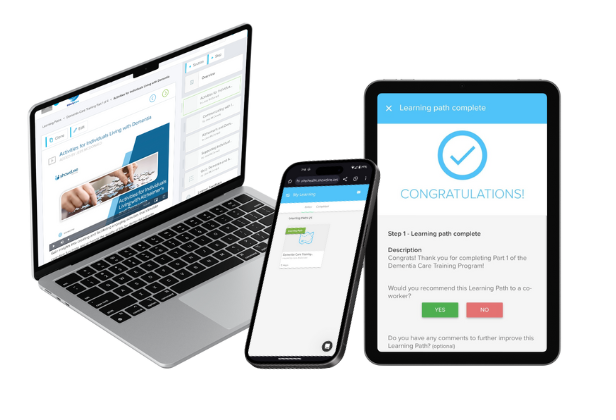Someone To Lean On: New Hire Mentor Programs That Drive Retention & Boost Satisfaction
Post - Someone To Lean On: New Hire Mentor Programs That Drive Retention & Boost Satisfaction
The world of post-acute care is fast-paced and demanding. New hires, especially those new to the industry, can feel overwhelmed navigating the intricacies of patient and patient and resident care, regulations, and the unique dynamics of a post-acute setting.
This is where a well-structured mentor program can be a game-changer.
Why Mentor Programs Work
Effective mentor programs offer a wealth of benefits for both new hires and your organization, including:
- Reduced Turnover: New hires with mentors are more likely to stay. Studies show retention rates are higher for mentees (72%) and mentors (69%) than those who do not participate in mentoring programs (49%)
- Improved Job Satisfaction: Mentorship provides a support system, boosting confidence and overall satisfaction
- Enhanced Skill Development: Mentors can bridge the gap between theoretical knowledge and practical application
- Knowledge Transfer: Mentorship facilitates the transfer of institutional knowledge and best practices
- Stronger Teams: Mentored employees feel more integrated into the team, fostering a collaborative environment
Identifying Goals For Your Mentor Program
The first step in creating an effective mentor program is clearly defining objections. Here are some key steps to ensure your mentor program is impactful:
- Shortened Onboarding Time: Mentors can help new hires navigate the onboarding process more effectively, reducing the time it takes for them to become productive members of the team.
- Skill Development: Identify the skills most critical for new hires in your organization and tailor the mentorship program to focus on those areas. This could include technical skills, soft skills, or a combination of both.
- Improved Retention Rates: A well-designed mentor program can help new hires feel more supported and valued, increasing their likelihood of staying with your company.
Recruiting The Right Mentors
Selecting the right mentors is critical to the success of the program. Choose experienced, patient, and enthusiastic staff who excel in their roles and demonstrate strong communication and interpersonal skills. Ideally, mentors should be passionate about helping others succeed.
After identifying potential mentors, it is important to provide them with training that covers mentorship principles, effective communication strategies, and ways to provide constructive feedback.
Make the Right Mentor & Mentee Match
An effective matching process can lead to more productive relationships and greater satisfaction for both mentors and mentees. When making the right match, consider the following:
- Personality: Match mentors and mentees with similar personalities to foster a positive working relationship.
- Learning Styles: Some mentees learn best by doing, while others prefer a more theoretical approach. Matching mentors with compatible learning styles can optimize the learning experience.
- Career Aspirations: If possible, try to match mentors and mentees with similar career goals. This can provide mentees with valuable insights into their desired career paths.
Implement a Structured Yet Flexible Mentorship Framework
While structure is important for setting expectations and providing consistency in the mentorship program, flexibility is crucial to accommodate the individual needs of mentees and the unpredictable nature of post-acute care settings.
Have mentors establish a regular meeting schedule but allow for flexibility to accommodate individual needs. These meetings should provide a dedicated time for focused discussions, goal setting, and progress reviews.
Encourage open communication between mentors and mentees, as well as with the program coordinator. The program coordinator should be available to address any concerns or challenges that may arise.
Measuring Success
Tracking your program’s effectiveness is crucial. Here are some metrics to consider:
- Time To Onboard: Assess the impact your program has on a new hire’s time to complete the onboarding process.
- Mentee Retention Rates: Monitor how long mentored employees stay with the organization.
- Mentee Surveys: Conduct surveys to gauge mentees’ satisfaction with the program and its impact on their experience.
- Mentor Feedback: Gather feedback from mentors to identify areas for improvement.
- Skill Development: Track the mentees’ progress towards acquiring new skills
Investing in your people through a well-designed mentor program is an investment in your organization’s success. By providing new hires with the support and guidance they need to thrive, you’ll build a stronger, more knowledgeable, and dedicated team, ready to deliver exceptional care.

Let Us Show You More
See how showdme's unique service-first approach to training helps hundreds of healthcare organizations ensure compliance. Request a demo today!

